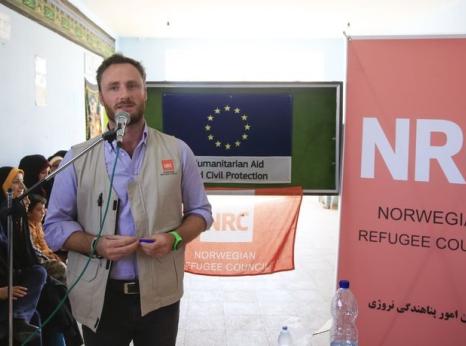Iran: Tortured Belgian Aid Worker Forcibly Disappeared

Olivier Vandecasteele is a Belgian aid worker who worked abroad for many years, including in Iran with the Norwegian Refugee Council and Relief International from 2015 to 2021. According to his family, he returned to Belgium in May 2021, and travelled back to Iran in February 2022 to pack his belongings. After his arrest in Tehran during this trip, Olivier Vandecasteele was transferred to Evin prison, where he was subjected to interrogations for three months without access to a lawyer. During this time, prison authorities exposed him to extreme cold and discomfort by denying him shoes and socks for months. During brief and rare phone calls believed to be in the presence of intelligence agents, his family learned that since his transfer to an unknown location in August 2022 Olivier Vandecasteele has only been permitted out of solitary confinement 15 minutes per day to walk alone in a courtyard. For consular meetings, he is blindfolded and temporarily transferred to Evin prison. The conditions of his detention and isolation are causing him great distress. He told his family that since his arrest, he has lost 25 kg and his toenails have fallen off, raising serious concerns about his health. His family also subsequently learned that he has blood pockets forming on his toes and is suffering from dental and gastric problems. Olivier Vandecasteele was taken once to a dentist who told him he required a follow up examination, which authorities have yet to schedule. He is also being denied nutritious food, including fruits and vegetables.
On 15 November 2022, in protest at his continued arbitrary detention, Olivier Vandecasteele began a hunger strike which lasted until early December 2022. During a consular meeting on 28 November 2022, Olivier Vandecasteele revealed that he had been taken to court without an independent lawyer of his own choosing. In court, he asked for a Belgian consular representative to be present, to which the judge responded, “they do not want to come”. Oliver Vandecasteele said he was subsequently convicted of the charges brought against him. On 13 December 2022, the Belgian Prime Minister and Minister for Justice informed Olivier Vandecasteele’s family that they had learned that he was convicted and sentenced to 28 years in prison. In subsequent phone calls to his family, Olivier Vandecasteele said that the Iranians authorities took him to court a second time in mid-December 2022 in handcuffs and leg chains. He believed the sole purpose of the session was for the proceedings to be filmed, noting that a camera and film crew were present in court. The lawyer of his own choosing remains barred from accessing Olivier Vandecasteele’s casefile and verdict, and his family understands that Olivier Vandecasteele’s government appointed lawyer, which authorities forced him to accept, did not appeal against the conviction and sentence.
Olivier Vandecasteele’s arbitrary arrest took place amidst the Iranian authorities’ well-documented pattern of arbitrarily detaining dual and foreign nationals as leverage, as highlighted by the UN Special Rapporteur on the situation of human rights in Iran, mostly recently in a July 2022 report, and the UN Working Group on Arbitrary Detention. Statements by the Belgium Minister of Justice on 14 December 2022 that Olivier Vandecasteele’s arrest was a direct consequence of the conviction of Asadollah Asadi, a former Iranian diplomat who is serving a 20-year sentence in Belgium for his role in a thwarted bomb attack at a 2018 rally in France, heightened concerns that Olivier Vandecasteele is being held to compel the Belgium authorities into a prisoner swap. Amnesty International also gathered information that Iranian officials privately told Olivier Vandecasteele on several occasions in 2022 that Belgium was “moving too slowly” on a bilateral treaty between Iran and Belgium, which would allow for the transfer of convicted foreign nationals to their home country and which was passed by the Belgium parliament in July 2022. The bilateral treaty between Belgium and Iran was finalized in a context where, according to public comments by Belgian authorities and media reports, the Iranian authorities were attempting to pursue a “deal” with Belgium to swap arbitrarily detained foreign and dual nationals in Iran. On 18 December 2022, five days after informing Olivier Vandecasteele’s family of his conviction and sentence, the Belgian government issued a statement urging all Belgian nationals in Iran to leave the country as they faced “high risk of arrest, arbitrary detention and unfair trial”. In light of the Iranian authorities’ practice of using detained dual and foreign nationals as leverage, Amnesty International has repeatedly urged all states whose nationals are or have been detained at any point in Iran to promptly examine whether the deprivation of liberty amounts to an act of hostage-taking, and if so, take all appropriate measures to ensure accountability. Under the International Convention against the Taking of Hostages, the crime of hostage-taking refers to the seizure or detention of any person accompanied with threats to cause them harm, including by killing, injuring or continuing to detain them, in order to compel a third party, such as a state, to do or abstain from doing any act as an explicit or implicit condition for the release of the hostage. There is no requirement under international law for the conditions attached to the release of a detainee to have been explicitly uttered for the act of detention to amount to the crime of hostage-taking.